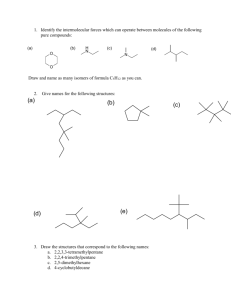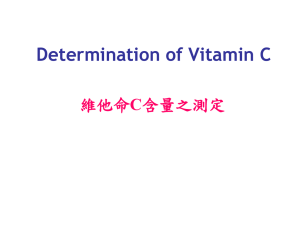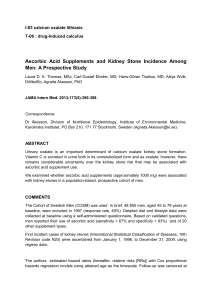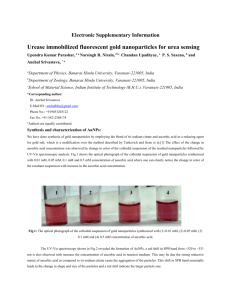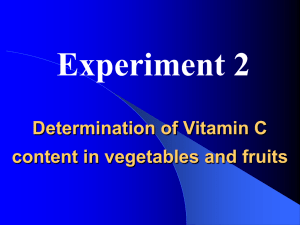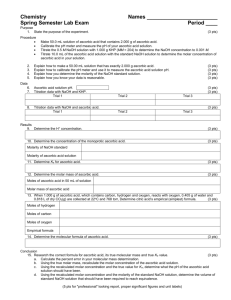Determination of Ascorbic acid Via Semi automated
advertisement
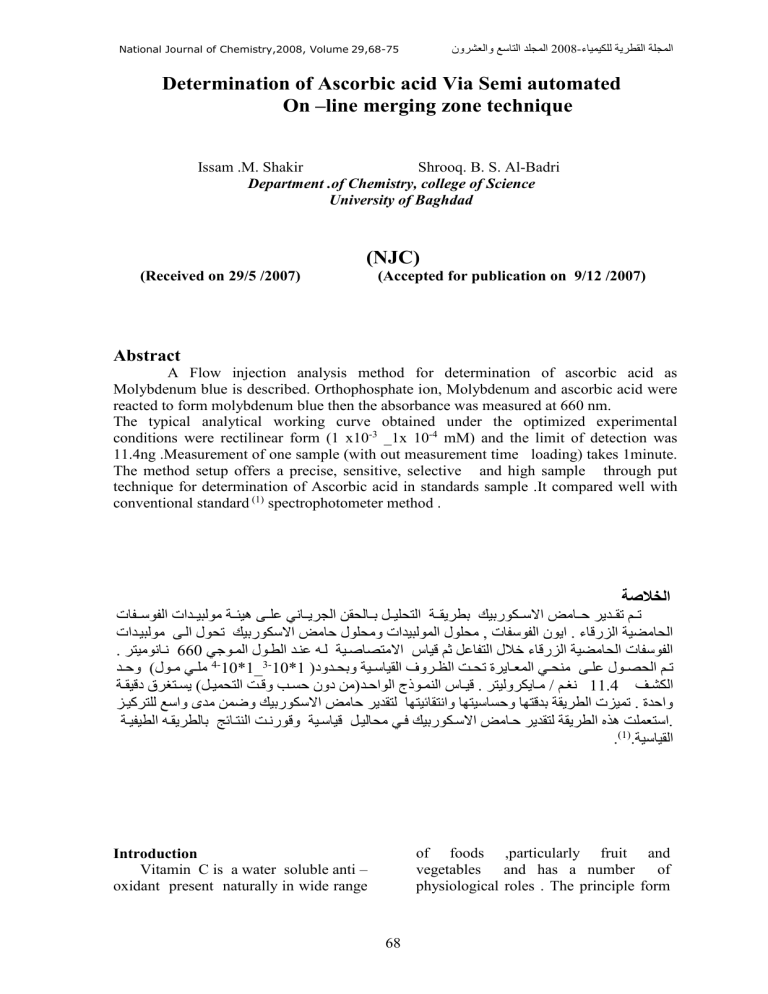
المجلد التاسع والعشرون2008-المجلة القطرية للكيمياء National Journal of Chemistry,2008, Volume 29,68-75 Determination of Ascorbic acid Via Semi automated On –line merging zone technique Issam .M. Shakir Shrooq. B. S. Al-Badri Department .of Chemistry, college of Science University of Baghdad (NJC) (Received on 29/5 /2007) (Accepted for publication on 9/12 /2007) Abstract A Flow injection analysis method for determination of ascorbic acid as Molybdenum blue is described. Orthophosphate ion, Molybdenum and ascorbic acid were reacted to form molybdenum blue then the absorbance was measured at 660 nm. The typical analytical working curve obtained under the optimized experimental conditions were rectilinear form (1 x10-3 _1x 10-4 mM) and the limit of detection was 11.4ng .Measurement of one sample (with out measurement time loading) takes 1minute. The method setup offers a precise, sensitive, selective and high sample through put technique for determination of Ascorbic acid in standards sample .It compared well with conventional standard (1) spectrophotometer method . الخالصة تممت تقممدير مماكو ايسممكطريية يطريقممة التنليممر يممالنق الجريممايد تلممف سياممة كطل يممدا ال طسمم ا كنلطل المطل يدا وكنلطل اكو ايسكطريية تنطل المف كطل يمدا, ايطن ال طس ا. الناكضية الزرقاء . يمايطكيتر660 ال طس ا الناكضية الزرقاء خالل الت اتر ثت قياس ايكتصاصمية لمع ت مد الطمطل الممط د كلممد كممطل و ممد4-10*1_3-10*1 ( تممت النصممطل تلممف ك نممد المعممايرت تنممو اللممروي القياسممية وينممدو قيمماس ال مممط الطا ممد(ك ون سممو وقممو التنميممر يسممتغرد قيقممة. كممايكروليتر/ يغممت11.4 الكشم تميز الطريقة يدقتها و ساسيتها وايتقائيتها لتقدير اكو ايسكطريية وضم كدى واسع للتركيمز. وا دت استعملو سذه الطريقة لتقدير ماكو ايسمكطريية مد كناليمر قياسمية وقطريمو ال تمائ يالطريقمع الطي يمة. .(1).القياسية of foods ,particularly fruit and vegetables and has a number of physiological roles . The principle form Introduction Vitamin C is a water soluble anti – oxidant present naturally in wide range 68 National Journal of Chemistry,2008, Volume 29,68-75 المجلد التاسع والعشرون2008-المجلة القطرية للكيمياء (13). The oxidation of ascorbic acid with permanganate has been used analytically with spectrophotometer (14), and chemiluminescence’s method (15-18) Experimental All reagents used were of analytical grade reagent. Orthophosphate ion standard solution (1000 ppm) was prepared by dissolving an appropriate amount of sodium orthophosphate in distilled water. Molybdenum standard solution (10 mM) was freshly prepared by dissolving an appropriate amount of ammonium molybdate in distilled water. Ascorbic acid (100 mM ) was prepared by direct dissolving in distilled water. The following equipments were used in the work: Spectronic 21Milton 120 Y Ray Company. Peristaltic pump model 37 SA. Valve (homemade). Quartz flow cell (1cm) and mixing coil (homemade). Recorder model pm 8222, dual-pen Philips Holland. Water-bath (Textron 30000543) Mode of operation Fig. (1) shows a carrier stream of Orthophosphate ion was pumpe. molybdenum ion solution was injected in the first loop and ascorbic acid was injected in the second loop .The carrier(phospho molybdic acid )and sample were mixed in the mixing at 60 cْ by using water bath and blue complex was measured at 660 nm. of Vitamin C is L-ascorbic acid (A.A), a though the first oxidation product, is the dehydrate ascorbic Acid (DHAA) which is also physiologically active. Ascorbic acid has limited Stability and may be lost during storage, preparation and cooking. For this reason, many foods are supplemented with the vitamin and nutritional supplements are available in which ascorbic acid is present alone or is formulated with other micronutrients at wide range of levels .The Eu recommend daily allowance of a 60 mg. (1, 2) ascorbic acid has been determined by a number of methods many of which are based on the oxidation of ascorbic acid to dehydrator ascorbic acid using a variety of reagents in which 2, 6 – dichlorophenol indophenol is the most commonly used (1, 3). Previous work has shown that the oxidation of ascorbic acid with phosphors vanado tungsten acid at pH=1.5, (4) Iron (III) converted to iron (II) by ascorbic acid to give complex (5).(2-Oximinocyclo hexamine) with absorption at 516 nm (6) or by hexacyano ferrate (7). Copper (II) converted to copper (I) by ascorbic acid (with neocuprion as reagent) to give complex which an absorption at450 nm. (8) A number of flow injection systems have been developed were Iodine (9) or bromine is reduced by ascorbic acid (10, 11). Enzyme catalyses oxidation with ascorbate oxidase (12) and photo oxidation with thionnine blue were used 69 المجلد التاسع والعشرون2008-المجلة القطرية للكيمياء National Journal of Chemistry,2008, Volume 29,68-75 Fig (1) : The manifold used for determination of Ascorbic acid (40micro liter) was optimum for ascorbic acid determination . Fig (4) show that 2 meter coil length for determination of ascorbic acid dipped in water bath at 60 c ْ was suitable. While fig(5) show effect of sample volume (50 micro liter was give height measured but 40 micro liter was suitable for this work) . Optimum flow rates (single line) were 24ml.min-1. Abs(expressed as average (n=3) PK.hgt in mV) Results and Discussion The effect of Molybdenum and phosphate concentration were studied. Fig (2) shows the variation of phosphate ion on the response of ascorbic acid determination and ,found that 9 ppm was the most suitable concentration to be used through out this work .While fig (3) shows the Variation of molybdenum ion concentration and found that 7mM 80 60 40 20 0 0 5 10 15 Con of Orthophosphate ion .ppm Fig (2) The effect of Orthophosphate ion concentration 70 المجلد التاسع والعشرون2008-المجلة القطرية للكيمياء Abs(expressed as average(n=3) pk.hgt in mV) National Journal of Chemistry,2008, Volume 29,68-75 35 30 25 20 15 10 5 0 0 5 10 15 Con.of Molybdeneum (VI) mM Abs(expressed as average (n=3) p.khgt in mV) Fig ( 3). The effect of Molybdenum concentration 60 50 40 30 20 10 0 0 1 2 3 4 5 Mixing coil lenght meter Abs(expressed as average(n=3)p.k.hgt in mV) Fig (4): Effect of mixing coil length (meter) 3.85 3.8 3.75 3.7 3.65 3.6 3.55 0 20 40 60 Sample Volume micro liter Fig (5): Effect of sample volume Calibration graph for Ascorbic acid gave a straight line up to1*10-3 mM With a correlation coefficient of 0.9736. The limit of detection was 11.4ng /40ul.The result obtained were treated by liner regression analysis show in Fig (7) while Fig(8) .shows the ( y ),(2 y ),(3 y ) standard deviation of the liner regression graph . While Fig (9) shows Calibration Plot for Ascorbic acid A (40 micro liter) sample volume containing various amount of ascorbic acid was treated according to the mentioned procedure. The typical detector response for ascorbic acid is show in fig ( 6) .The response peak appeared at about 1 minute after the injection of Ascorbic acid solution. 71 National Journal of Chemistry,2008, Volume 29,68-75 the percentage residual of the Calibration graph .Table no.(1) tabulate linear analysis data and the ANOVA المجلد التاسع والعشرون2008-المجلة القطرية للكيمياء analysis table for the linear Calibration graph Fig (6) : Variation of absorbance of released Molybdenum blue for the determination of Ascorbic acid (1*10 -4 ,6*10 -4 ,1*10 -3 mM) Fig (7): Calibration graph of ascorbic acid 72 National Journal of Chemistry,2008, Volume 29,68-75 Fig (8): The ( y المجلد التاسع والعشرون2008-المجلة القطرية للكيمياء ),(2 y ),(3 y ) standard deviation of the liner calibration graph Fig (9): Percentage Residual of all Ascorbic acid concentration 73 المجلد التاسع والعشرون2008-المجلة القطرية للكيمياء National Journal of Chemistry,2008, Volume 29,68-75 used through calibration graph . Table (1) : Linear regression analysis of ascorbic acid determination and the ANOVA analysis table Para Value Std Error t-Value 95% Confidence Limits a 3.03532 1.66168 1.82664 -1.23618_7.3068 b 27704 27704 9.57749 20268.3_35139.8 source DF Mean Square F-Statistic Regr Sum of squares 719.27404 1 719.27404 Error 39.2067 5 7.84134 Total 758.48077 6 91.72839 when compared with standard spectrophotometer Method .there for it can regarded as alternative determination method from the many advantages that this method have . Determination of Ascorbic acid in solution Table ( 2 ) shows the agreement between the results in both methods and the paired t-test illustrates that the FIA method has no significance difference Table (2 ): Comparison of results obtained for Ascorbic acid concentration in Standard solution utilizing the FIA method and standard method. Sample Concentration .of A.A d Xd (M) (M) FIA standard (1) 6*10-4 6.5*10-4 0.5*10-4 (2) 3*10-4 3.5*10-4 0.5*10-4 (3) 9.5*10-4 10.3 *10-4 0.8*10-4 74 Sd (1) (M) 6*10-5 1.732*10-5 Paired t -test T form table at 95% n-1 0.600>4.303 National Journal of Chemistry,2008, Volume 29,68-75 المجلد التاسع والعشرون2008-المجلة القطرية للكيمياء reproducibility obtained for the individual sample Solutions ( %RSD= zero, for n=3) was zero ,for A.A . The ease of application of the indirect spectrophotometer determination of A.A is clearly an advantage compared with other spectrophotometer methods (1). Conclusion The pre sent method allows semiautomated highly sensitive, micro determination of A.A. It takes 3min for a single complete measurement ,while it takes only 1mintes for each sample loading to determine A.A The Reference 1. W .Horwitz ,Offical Methods of the Association of Official Analytical chemists .; 1980, 13 , 43-056. 2. V.Tyler,l. Brady ,J.Rbers ,Pharmacognosy.; 1988,9,307_309 . 3. L. Erdeg ,Indicators, Pergamon Oxford .; 1972, 458 . 4. U.Muralikr Ishna and J. Adinarayana Murty, Analyst.; 1989,114,407-408. 5. A.A .alwarthan , Analyst .; 1993, 118,639. 6. F.Salinas and T.Galeano ,Analyst .; 1988,113,1657-1659. 7. Z.Zhang .W.Qin ,Talanta .;1996, 43,119. 8. W.Buker and T.lowe ,Analyst .;1985,110,1189-1191. 9. F. Lazaeo,A.rios and M.d.luque ,Analyst .;1986,111,163. 10. I.M.A. shaker ,W.S. Ulaiwi, National journal of chemistry.; 2001,1,1. 11. I.M.A.shaker , N.S.Turkie, W.S.Ulaiwi ,National journal of chemistry.; 2001,1,24. 12. K.Sato .Y.Chiba.S.Tanak ,Anal Chim Acta .; 1993,61,277. 13. T.Perez-Ruiz.C. Martines_ Lozano. V.Tomas .C.Sidrach, Analyst .;1997,122,115. 14. A.M.Hammam.K.A.Idriss, J.Indian chem..soc.; 1981,58,140. 15. C.Q.Zhu.L.Wang .J. L. Wu. Fenxi Shiyanshi.; 1996,15,49. 16. Agater_IB,Jewsbury, Analytica chimica. Acta.;1997,356,289-294. 17. Mank_HB ,Zhang_H, Analytica chimica.Acta.; 1999,385,281-285. 18. Guo-Fang.Zhang and H ong-Yuan .Chen,Analytical Sciences.; 2000, 16,1317-1321. 75
